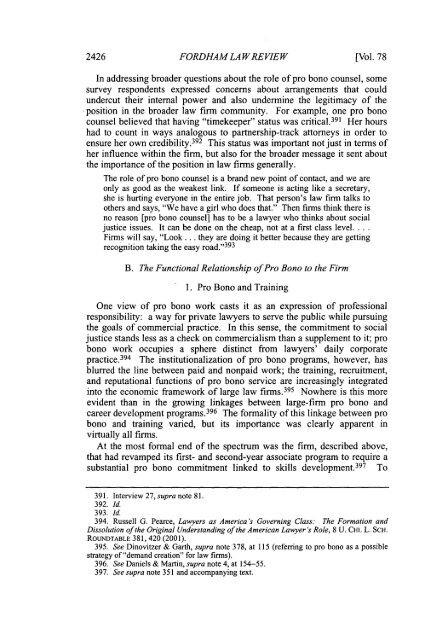Law for The Poor
Law for The Poor
Law for The Poor
You also want an ePaper? Increase the reach of your titles
YUMPU automatically turns print PDFs into web optimized ePapers that Google loves.
2426 FORDHAM LA W REVIEW<br />
[Vol. 78<br />
In addressing broader questions about the role of pro bono counsel, some<br />
survey respondents expressed concerns about arrangements that could<br />
undercut their internal power and also undermine the legitimacy of the<br />
-position in the broader law firm community. For example, one pro bono<br />
counsel believed that having "timekeeper" status was critical. 391 Her hours<br />
had to count in ways analogous to partnership-track attorneys in order to<br />
ensure her own credibility. 392 This status was important not just in terms of<br />
her influence within the firm, but also <strong>for</strong> the broader message it sent about<br />
the importance of the position in law firms generally.<br />
<strong>The</strong> role of pro bono counsel is a brand new point of contact, and we are<br />
only as good as the weakest link. If someone is acting like a secretary,<br />
she is hurting everyone in the entire job. That person's law firm talks to<br />
others and says, "We have a girl who does that." <strong>The</strong>n firms think there is<br />
no reason [pro bono counsel] has to be a lawyer who thinks about social<br />
justice issues. It can be done on the cheap, not at a first class level....<br />
Firms will say, "Look... they are doing it better because they are getting<br />
recognition taking the easy road." '393<br />
B. <strong>The</strong> Functional Relationship of Pro Bono to the Firm<br />
1. Pro Bono and Training<br />
One view of pro bono work casts it as an expression of professional<br />
responsibility: a way <strong>for</strong> private lawyers to serve the public while pursuing<br />
the goals of commercial practice. In this sense, the commitment to social<br />
justice stands less as a check on commercialism than a supplement to it; pro<br />
bono work occupies a sphere distinct from lawyers' daily corporate<br />
practice. 394 <strong>The</strong> institutionalization of pro bono programs, however, has<br />
blurred the line between paid and nonpaid work; the training, recruitment,<br />
and reputational functions of pro bono service are increasingly integrated<br />
into the economic framework of large law firms. 395 Nowhere is this more<br />
evident than in the growing linkages between large-firm pro bono and<br />
career development programs. 396 <strong>The</strong> <strong>for</strong>mality of this linkage between pro<br />
bono and training varied, but its importance was clearly apparent in<br />
virtually all firms.<br />
At the most <strong>for</strong>mal end of the spectrum was the firm, described above,<br />
that had revamped its first- and second-year associate program to require a<br />
substantial pro bono commitment linked to skills development. 397 To<br />
391. Interview 27, supra note 81.<br />
392. Id.<br />
393. Id.<br />
394. Russell G. Pearce, <strong>Law</strong>yers as America's Governing Class: <strong>The</strong> Formation and<br />
Dissolution of the Original Understanding of the American <strong>Law</strong>yer's Role, 8 U. CHI. L. ScH.<br />
ROUNDTABLE 381, 420 (2001).<br />
395. See Dinovitzer & Garth, supra note 378, at 115 (referring to pro bono as a possible<br />
strategy of "demand creation" <strong>for</strong> law firms).<br />
396. See Daniels & Martin, supra note 4, at 154-55.<br />
397. See supra note 351 and accompanying text.

















